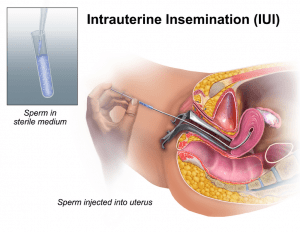Last Updated on April 30, 2025
For many couples dealing with fertility problems, Intrauterine Insemination (IUI) is a first-line treatment. It is considered non-invasive and costs much less than In Vitro Fertilization (IVF). Many doctors suggest that couples start out by trying IUI before moving to IVF.
IUI Treatment Can Address Common Infertility Factors
Female Factors:
When female patients have normal fallopian tubes, IUI can be used to successfully address:
- Cervical Factors
- Anovulation
- Some Immunological factors
- Other unexplained factors
Male Factors:
Generally, when male factor infertility is the issue, IUI can address the amount and quality of sperm that gets through the cervix to induce ovulation. These include:
- Physical barriers, such as hypospadias (a birth defect in which the opening of the urethra is on the underside of the penis instead of the tip).
- Congenital defects
- Sperm production disorders
- Vasectomy
- Varicocele – an abnormally large vein draining the testicles
- Other sperm production issues
- Ejaculation disorders
- Premature ejaculation
- Retrograde ejaculation (when the ejaculate is forced into the bladder rather than the vagina at orgasm)
- Delayed ejaculation
- Certain immunological disorders
How IUI can Help with Immunological Factors
 IUI can aid in achieving conception in the presence of certain immunological factors, such as: the destruction of gametes by anti-sperm antibodies (ASA)/anti-ovary antibodies or the inhibition of sperm-egg binding.
IUI can aid in achieving conception in the presence of certain immunological factors, such as: the destruction of gametes by anti-sperm antibodies (ASA)/anti-ovary antibodies or the inhibition of sperm-egg binding.
Some patients with other immunological conditions, such as lupus or rheumatoid arthritis (RA), may not be candidates for IUI. This is because these conditions cause reduced fertility and worsened pregnancy outcomes. In addition, people with a personal or family history of lupus or RA have an increased risk of having Immunologic Implantation Dysfunction (IID). IID adversely affects the receptivity of the uterine lining to accept a fertilized egg. IID can be tested for, though, and the results should be considered when deciding on IUI.
IUI Has Good Results and Is Less Expensive
Certain women with endometriosis can benefit from IUI. However, it is not recommended for women of advanced maternal age, blocked Fallopian tubes, or severe male factor infertility. In the case of severe male factor infertility, donor sperm can be used.
Although some experts suggest starting with IVF because “you wind up there anyway” if IUI doesn’t work, IUI can be the better option for many couples. With pregnancy rates of 20-30% after three cycles, this outcome is better than continuing to try to get pregnant on your own without the desired results. In addition, IUI can be significantly less expensive than IVF, making it an even more attractive option.
Explore IUI Treatment at Atlantic Reproductive
If you’ve been trying to get pregnant naturally for 12 months or more and have been unsuccessful, contact Atlantic Reproductive Medicine Specialists to discuss whether IUI is the right path for you.

